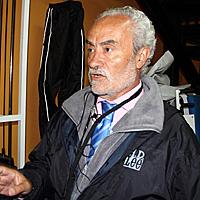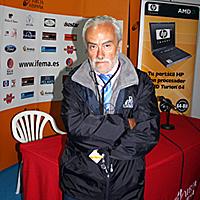
Recently on Cyclingnews.com |
An interview with Victor Cordero, September 14, 2005
The Vuelta's numero uno
Victor Cordero is the Vuelta a Espaņa's version of Jean Marie Leblanc. As general director of the race, his responsibilities range from the race course to sponsors and accommodation for the entire circus. And more. Cyclingnews' Hernan Alvarez Macias caught up with Cordero after stage 15 of the Vuelta at Pajares's ski station. The Vuelta's numero uno talked about the race itself, the Pro Tour, World Championships and UCI presidential elections.
Cyclingnews: How is the Vuelta going so far?

|
Victor Cordero: My impression of this race couldn't be better after a stage like today's [stage 15 was won by Liberty's Roberto Heras in Pajares]. I think a stage like this hasn't been seen for a long time. The stage was planned strategically [by Liberty Seguros], tactically well developed, with weather conditions that attract cycling fans and a spectacular result. I guess it was one of those stages that entices the TV viewer. If I have to judge the Vuelta by today's performance, the judgment couldn't be better.
Stage 15 was the best stage of this year's race so far. There were a number of riders who were riding very well up until today, and it looked as if the Vuelta was over. We have seen it's not over. And I guess that after stage 15 the Vuelta is not over yet, either. It will be very difficult for others to catch Heras, [who is first on GC by 4'30] but it's not over. There will be final differences in time similar to the ones seen in the Tour [de France]. The Vuelta's differences aren't ever very big - there's still a race for the one who wants to attack.
CN: And in terms of organisation, what do you think about the race?
VC: We began a week before when we started over the past few years - it's the first time we've started the race in August. This fact complicated things for us a bit, especially in terms of accommodation during the first week until we turned to Andorra. We've fixed it the best we could, because our biggest concern are the teams.
In terms of infrastructure, it's fine. We were capable of changing the course twice when it was necessary. Especially stage 13 when going to the Santuario de la Bien Aparecida. Fortunately, we have the State's security men who are very professional, and this helps enormously when fixing these type of problems.
CN: It's been more than eight months since the beginning of the UCI ProTour. What do you think about it?
VC: We have to see how the general classification ends [after the Vuelta]. One are where we could see improvement is the fact that the Vuelta's top 10 overall wouldn't be all Spanish riders; even the top 20 [up till stage 15, the top 10 had just two non-Spaniards and the top 20 just five non Spanish riders - ed.]. Once again, we've seen that they are [non Spanish riders] very excited about the race. Denis [Menchov] had a hard day on stage 15, and didn't have his best team. In the end, I'd highlight the fact that many teams came to race because of the Pro Tour, and they've been able to discover the race. This would be the most positive thing, even though other teams haven't performed as well as they wanted to.

|
CN: Referring to the elections for the UCI presidency to be held in the coming days. What is your personal opinion?
VC: I don't vote and I don't have a preferred candidate, least of all introducing or supporting a candidate, as some people say. I don't support anybody. If I had to choose, I don't hide the fact that I would vote for Gregorio Moreno. That's perfectly clear. But he's not the candidate the three Grand Tour organisers support. Neither of the three [Grand Tour directors] has asked him to present his candidature. Here in Spain, the riders' and teams' associations and the organisers' association asked Gregorio Moreno to go for president. I honestly think he knows perfectly clearly what should be improved in the Pro Tour in order to reach an agreement for better cycling. I want to clearly state that, and I say this in the name of the Giro and the Tour too, he is not a candidate of the three [Grand Tour organisers].
CN: How is the World Championships organisation going, considering your company Unipublic also runs this championship in 2005?
VC: It's as if this Vuelta a Espaņa has four weeks instead of three, because we are the same organising entity; the same management team and company who are organising the World Championships. We had a clear goal: that these Worlds would be the best in history. The organisers of the next championships will want to improve on our performance - this is a good thing.
CN: That's a very high goal, right?
VC: Every organising committee wants to stage the best event, and we will try to do that. We have a big advantage, I think; the championships will be held in the capital of Spain and this is something very uncommon. One of the last championships was in Lisbon, but in the suburbs. The weekend road races on Saturday and Sunday are completely in a urban circuit over the streets of Madrid. This will mean that there will be around 1 - 1.5 million people actually on the streets watching the racing. And this will mean that the riders will have more support than usual - that can only be a good thing for the quality of the racing.
